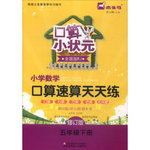题目内容
It ________ Bob drives badly.
|
A.thinks that |
B.is thought what |
C.thought that |
D.is thought that |
D
【解析】略

 口算小状元口算速算天天练系列答案
口算小状元口算速算天天练系列答案
| |||||||||||||||||||||||||||||||||||||||||||||||||||||||||||||||||||||||||
Cure for Sorrow
There is an old story telling about a woman whose only son died in an accident. In her 31 , she went to the wise man that is always 32 for his wisdom in her town and said, “What advice or what 33 ways do you have to bring my son back to life? I will 34 you with all I have if you can.”
Instead of sending her away or 35 with her, he said to her, “Fetch me a mustard(芥末) seed from a home that has never 36 sorrow. We will use it to drive the sorrow out of your life.” The woman went off at once in 37 of that magical mustard seed.
She came first to a splendid apartment, 38 at the door, and said in a 39 voice, “I am looking for a home that has never known sorrow. Is this such a(n) 40 that I want? It is very important to me.”
41 , she didn’t get what she wanted, even without a single word of 42 . They told her that she had come to the wrong place. And they began to 43 all the tragic things that recently had happened to them.
The woman said to herself, “Who is better able to help these poor, 44 people than I, though I also have had misfortune of my own?” She 45 to comfort them till they 46 . Then she went on searching for a home that had never known sorrow. But 47 she turned up, in small cottages or in other places, she found one 48 after another of sadness and misfortune. She became so 49 in helping other people out of their sorrow that finally she forgot about her quest for the special mustard seed, in fact, never 50 that it had driven the sorrow out of her life.
|
1. |
|
|
2. |
|
|
3. |
|
|
4. |
|
|
5. |
|
|
6. |
|
|
7. |
|
|
8. |
|
|
9. |
|
|
10. |
|
|
11. |
|
|
12. |
|
|
13. |
|
|
14. |
|
|
15. |
|
|
16. |
|
|
17. |
|
|
18. |
|
|
19. |
|
|
20. |
|